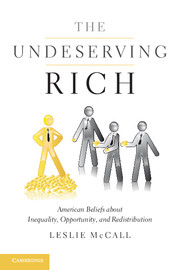Book contents
- Frontmatter
- Contents
- Tables and Figures
- Preface and Acknowledgments
- Introduction: Thinking about Income Inequality
- 1 Beyond the Opposition between Opportunity and Inequality
- 2 The Emergence of a New Social Issue
- 3 American Beliefs about Income Inequality
- 4 Why Do Americans Care about Income Inequality?
- 5 Americans' Social Policy Preferences in the Era of Rising Inequality
- Conclusion: A New Era of Beliefs about Inequality
- Notes
- References
- Index
1 - Beyond the Opposition between Opportunity and Inequality
Theories of American Beliefs about Inequality from the Nineteenth Century to the Present
Published online by Cambridge University Press: 05 April 2013
- Frontmatter
- Contents
- Tables and Figures
- Preface and Acknowledgments
- Introduction: Thinking about Income Inequality
- 1 Beyond the Opposition between Opportunity and Inequality
- 2 The Emergence of a New Social Issue
- 3 American Beliefs about Income Inequality
- 4 Why Do Americans Care about Income Inequality?
- 5 Americans' Social Policy Preferences in the Era of Rising Inequality
- Conclusion: A New Era of Beliefs about Inequality
- Notes
- References
- Index
Summary
When economists first began documenting the rise in inequality in the 1980s and 1990s, they naturally placed economic solutions at the top of the list of remedies for what was then considered a predominantly economic problem. Based on their assessment of the causes of rising inequality, economists advocated everything from raising the minimum wage and stemming union decline to curtailing immigration and trade with low-wage countries. Increasing the human capital of the nation was – and still is – an especially favored solution. Yet despite convincing research and a few policy successes, little has been done to reduce inequality in any substantial way. By the early 2000s, this fact prompted a political turn in the debate over inequality. Politics began to figure more prominently as both cause and solution. In fact, a rapidly expanding stream of research by some of the nation's leading political scientists is interrogating anew the centuries-old question of how political and economic inequality are intertwined.
Very much in its early stages, political research on rising income inequality is already covering a broader swath of topics than just a few years ago. But one of the central topics in this discussion has not changed much. It concerns the long-standing question of why the United States does so little to redistribute income despite its high level of market inequality. One might answer this question in a number of different ways, but a common reply is that Americans care only about opportunity and not about inequality, preventing significant redistributive policies from seeing the light of day. Although scholars increasingly greet this claim with a skeptical eye, it nevertheless remains deep-seated.
- Type
- Chapter
- Information
- The Undeserving RichAmerican Beliefs about Inequality, Opportunity, and Redistribution, pp. 21 - 52Publisher: Cambridge University PressPrint publication year: 2013



